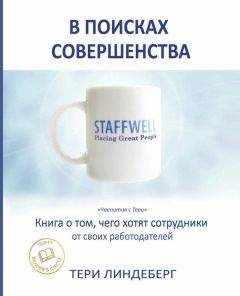Ознакомительная версия.
49. "Если предположить, что отрасль уже достигла стадии медленного роста…": Burton H. Klein, Dynamic Economics (Cambridge, Mass.: Harvard University Press, 1977), p. 17.
50. "Сам процесс, посредством которого фирма становится…": Gilder, p. 79.
51. "подлинным секретом успеха руководства IBM…": Robert Sobel, IBM: Colossus in Transition (New York: Times Books, 1986), p. 346.
52. "Бизнесменам придется научиться создавать новаторские организации…": Drucker, p. 54.
53. "постоянная реорганизация — вот основная причина…": Norman Macrae, "The Coming Entrepreneurial Revolution: A Survey", The Economist, December 25, 1976, pp. 41, 43.
54. "… мы можем предсказать утрату превосходства структуры…": H. Igor Ansoff, "Corporate Structure Present and Future", Vanderbilt University Working Paper 74–4, February 1974, p. 17.
55. "Десять лет тому назад Ford Motor Co. построила завод…": "It Seemed Like a Good Idea at the Time", Science 82, January/February 1982, p. 86.
56. Markets and Hierarchies: Oliver E. Williamson, Markets and Hierarchies: Analysis and Antitrust Implications (New York: Free Press, 1975).
57. "Биолог-эволюционист Стефен Джей Гоулд…": Stephen Jay Gould, The Panda's Thumb: More Reflections in Natural History (New York: Norton, 1980), p. 51.
58. "…появление ни одного из важных новых продуктов IBM за последние двадцать пять лет…": James Brian Quinn, "Technological Innovation, Entrepreneurship, and Strategy", Sloan Management Review, spring 1979, p. 25.
59. "…разработчики первых компьютеров находили для них лишь очень узкий круг применений…": James M. Utterback, "Patterns of Industrial Innovation", in Technology, Innovation, and Corporate Strategy: A Special Executive Seminar Presented by the Massachusetts Institute of Technology, November 17, 1978 (Cambridge, Mass.: Industrial Liaison Program, MIT, 1978).
60. The External Control of Organizations: A Resource Dependence Perspective: Jeffrey Pfeffer and Gerald R. Salancik, The External Control of Organizations: A Resource Dependence Perspective (New York: Harper & Row, 1978).
61. "Главный тезис этой книги заключается в следующем…": там же, p. xi.
62. "Эта инициатива предполагает специальные контакты с окружением…": Utterback, pp. 37–38.
1. "Уоррен Беннис…": Warren Bennis, "The Temporary Society", in The Temporary Society by Warren G. Bennis and Philip E. Slater (New York: Harper & Row, 1968).
2. "…и Элвин Тоффлер…": Alvin Toffler, The Third Wave (New York: Morrow, 1980).
3. "Управлением, которое видно каждому" ("Visible Management")…": Richard Т. Pascale, The Role of the Chief Executive in the Implementation of Corporate Policy: A Conceptual Framework", Research Paper no. 357 (Graduate School of Business, Stanford University, February 1977), pp. 37, 39.
4. "В Hewlett-Packard MBWA (эту аббревиатуру здесь трактуют как…": William R. Hewlett and David Packard, The HP Way (Palo Alto, Calif.: Hewlett-Packard, 1980), p. 10.
5. "В новых зданиях компании Corning Glass вместо лифтов смонтированы эскалаторы…": Edward Meadows, "How Three Companies Increased Their Productivity", Fortune, March 10, 1980, p. 95.
6. "В словах одного из высших руководителей Chase звучало невольное восхищение…": Alena Wels, "How Citicorp Restructured for the Eighties", Euromoney, April 1980, p. 13.
7. "Для успешной реализации новых проектов каждый раз требуются…": Susan Benner, "Не Gave Key People a Reason to Stay with the Company", Inc., September 1980, p. 46.
8. "Главной составляющей успеха Harris Corporation является…": Robert J. Flaherty, "Karris Corp.'s Remarkable Metamorphosis", Forbes, May 26, 1980, p. 46.
9. "Важнейшим строительным блоком компании является…": Ezra F. Vogel, Japan As Number One: Lessons for America (Cambridge, Mass.: Harvard University Press, 1979), pp. 143–45.
10. "подвижной, проектно-ориентированной средой…": Shepherd and Bucy, "Innovation at Texas Instruments", p. 88.
11. "Необходимость открытых коммуникаций подчеркивал сотрудник IBM Фредерик Брукс…": Frederick P. Brooks, Jr., The Mythical Man-Month: Essays on Software Engineering (Reading, Mass.: Addison-Wesley, 1978).
12. "У каждого было право высказывать предложения, выполнять которые вменялось в обязанность всем остальным…": там же, p. 67.
13. "Основным механизмом реализации этого проекта стала классическая организация…": Charles С. Burck, "How GM Turned Itself Around", Fortune, January 16, 1978.
14. "Вместо того, чтобы тестировать каждый компонент двигательных установок…": R. Jeffrey Smith, "Shuttle Problems Compromise Space Program", Science, November 1979, pp. 910–11.
15. "Они удивлялись сами себе…": Mariann Jelinek, Institutionalizing Innovation: A Study of Organizational Learning Systems (New York: Praeger. 1979), p. 78.
16. "Наш подход заключается в том, чтобы сделать…": Smith, "3M", p. 94.
17. "один из аналитиков назвал 'страстью к тестированию'…": Business Week, October I, 1979, p. 80.
18. " Bioomingdale's является едва ли не единственной крупной компанией розничной торговли… ": Mark Stevens, "Like No Other Store in the World": The Inside Story of Bioomingdale's (New York: Crowell, 1979), p. 138.
19. "Я все больше склоняюсь к тому, чтобы…": William Shockley, "A Case: Observations on the Development of the Transistor", in The Creative Organization, ed. Gary A. Steiner (Chicago: University of Chicago Press, 1965), pp. 139–40.
20. "Самым важным в словаре рекламодателя…": David Ogilvy, Confessions of an Advertising Man (New York: Atheneum, 1980), p. 86.
21. "Слышали ли вы об объективах с переменным фокусным расстоянием?": Peter G. Peterson, "Some Approaches to Innovation in Industry-Discussion", in The Creative Organization, pp. 191–92.
22. "В своей классической работе…": S. I. Hayakawa, Language in Thought and Action (London: Allen & Unwin, 1974).
23. "Большинство удачных результатов не могли предвидеть…": Donald D. Holt, "How Amoco Finds All That Oil", Fortune, September 8, 1980, p. 51.
24. "Мой личный опыт свидетельствует о том, что люди…": Harold Guetzkow, "The Creative Person in Organizations", in The Creative Organization, p. 49.
25. "Себестоимость нового дисковода оказалась…": Bro Uttal, "Storage Technology Goes for the Gold", Fortune, April 6, 1981, p. 58.
26. "В то время у меня не было никаких властных полномочий…": Isadore Barmash, For the Good of the Company: Work and Interplay in a Major American Corporation (New York: Grosset & Dunlap, 1976), pp. 43–44, 52–54.
27. "Основная идея заключается в том, чтобы…": Robert H. Schaffer, "Make Success the Building Block", Management Review, August 1981, pp. 47, 49–51.
28. "Выберите какое-то одно направление…": там же, p. 51.
29. "Дюпре терпеть не мог, когда длина памятной записки…": Oscar Schisgall, Eyes on Tomorrow: the Evolution of Procter & Gamble (Chicago: J. C. Ferguson, 1981), p. 120.
30. " Кратко изложенная презентация, в которой факты отделены от мнений…": Thomas J. Peters, "The 1-Page Memo (and Other Draconian Measures)" (unpublished manuscript, April 1980), p. 1.
31. "Они столь щепетильны, что иногда это просто раздражает…": "P&G's New New-Product Onslaught", Business Week, October 1, 1979, p. 80.
32. "Procter & Gamble — чрезвычайно осмотрительная и придирчивая компания…": Lee Smith, "A Superpower Enters the Soft-Drink Wars", Fortune, June 30, 1980, p. 77.
33. "Хорхе Диас Серрано…": Alan Riding, "Mexico's Oil Man Proved His Point", New York Vines, July 16, 1978, p. F5.
34. "Меня знают как человека, который ненавидит бумаги…": "Paper Work Is Avoidable (If You Call the Shots)", Wall Street Journal, June 17, 1977, p. 24.
35. "Каждый месяц деятельность руководителей подразделений и их непосредственных подчиненных…": Thomas J. Peters, "Management Systems; The Language of Organizational Character and Competence", Organisational Dynamics, summer 1980, p. 15.
36. "Несмотря на то, что головной офис не предъявляет особых требований…": Geoffrey Foster, "Dana's Strange Disciplines", Management Today, September 1976, p. 61.
Ознакомительная версия.





